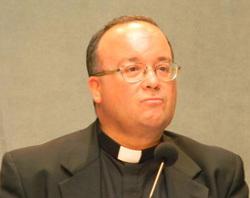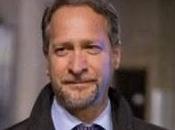Non si rendono noti i motivi della riduzione allo stato laicale. Si indica, da parte della Congregazione della dottrina della fede (ex Sant’Uffizio), la procedura seguita: il canone 1720 che si applica in casi gravi come la pedofilia o abusi sessuali su minori, assoluzione del complice e altro ancora. Una procedura particolare dedicata a delitti gravi. Qualcuno naturalmente, nell’ex Sant’Uffizio, sa bene qual è l’accusa. Il vescovo di Crema lo sa? Non lo sappiamo. Non possiamo saperlo. Il reato è stato segnalato all’autorità giudiziaria?

mons. Charles Scicluna, già promotore di giustizia del Vaticano
Non possiamo sapere neppure questo. Sulla responsabilità e gli obblighi dei vescovi si è discusso non poco negli ultimi tempi. Ci sono state frizioni fra l’ex Procuratore di giustizia Charles Scicluna e la Cei. Da parte propria monsignor Scicluna, ormai trasferito a Malta in un ufficetto, sosteneva che bisogna porre fine all’omertà sulla pedofilia nel clero. Bisognava quindi far sì che i vescovi segnalassero alla magistratura i reati dei sacerdoti. La Cei si era opposta, notando che nella legislazione italiana questo non è previsto.
Resta il fatto che si tratta di delitti gravi, qualora vengano accertati. Ogni vescovo organizza, com’è normale in un’organizzazione ampia e assai attiva, un proprio carteggio sui singoli sacerdoti. Si registra quando arrivano, quando sono trasferiti, gli eventi più importanti. Una normale procedura: ogni ufficio del personale, ogni direttore del personale segue un principio paragonabile.
Questi dati vengono tenuti in una cassaforte, da parte dei vescovi, a meno che non si proceda già tramite computer e password complicate e incrociate.
In ogni caso qualcuno sa bene che cos’ha fatto Mauro Inzoli per essere spretato. Decisione sospesa in attesa di un eventuale ricorso dell’ex monsignore.
Un protagonista della vita pubblica di Crema, già presidente del Banco Alimentare, è al centro di una vicenda secretata. Filtrano indiscrezioni, si conosce una casistica consolidata, ci sono tracce inquietanti sul Web, già qui indicate, eppure non viene fatto un pronunciamento chiaro, come accadrebbe a qualsiasi cittadino sottoposto all’esame della magistratura per gli stessi atti.
Un pedofilo non sacerdote sappiamo che cosa rischia. Sappiamo anche che cosa può non rischiare un sacerdote pedofilo.
Inzoli o non Inzoli, Comunione e Liberazione o no, va considerato questo primato di ciò che ha subito un’eventuale vittima. Questo vale per il caso generale in questione, che in concreto oggi riguarda una persona, ma in Italia già ha riguardato altre persone, altri sacerdoti e altre vittime.
Constato dalle reazioni che non viene compreso questo semplice punto di vista. Non è in atto una battaglia politica contro Formigoni, anche se Comunione e Liberazione è un risvolto essenziale. Ma più importante e insuperabile è la presenza eventuale di una vittima. Eventuale ma probabile.
Avvolgere tutto questo nel mistero suscita grande indignazione. Non anticlericalismo o ostilità al Cristianesimo (che c’entra la libertà di professare una religione?). Ma indignazione perché non tutti sono uguali davanti alla legge.
Sempre ammesso (e chissà perché non si deve sapere, forse siamo tutti considerati incapaci di capire) che già non sia intervenuta la magistratura.
Riporto qui sotto un articolo in inglese che spiega l’importanza della battaglia di monsignor Scicluna, riprendendo il testo da http://www.catholicnewsagency.com/news/msgr.-scicluna-new-norms-important-ongoing-action-needed/
Vatican City, Jul 15, 2010 / 03:35 pm (CNA/EWTN News).- Monsignor Charles Scicluna took part in a press briefing on Thursday for the release of modified Vatican norms on how to examine and punish cases involving the “most serious sins.” He fielded a number of questions as to its content but underscored the importance of ongoing action for successfully bringing about change in the Church.
Journalists in the Holy See’s Press Office spoke of the encounter as “unseen since the days of Cardinal Ratzinger.” The Maltese promotor of justice of the Congregation for the Doctrine of the Faith fielded questions on complex matters with apparent ease, answering journalists’ queries regarding many aspects of the updates to the Motu Proprio of 2001 in both English and Italian.
About the concern in the media that sexual abuse against minors was being equated with the attempted ordination of women in the eyes of canon law, Msgr. Scicluna said in English, “They are not on the same level.” Serious sins are divided into those against Christian morality and those committed during the administration of the sacraments, he explained.
Sexual abuses of minors and child pornography are the graver sins and represent “an egregious violation of moral law.” And while the attempted ordination is grave, it’s “on another level,” he said, explaining that it is a wound that goes against the Catholic faith and the sacrament of Holy Orders.
“So they are (both) grave but on different levels,” Msgr. Scicluna said, noting in Italian that their comparison is incidental as both “are found in the only document that attempts to put in order all of the competence on the delicts that are reserved to the Congregation for the Doctrine of the Faith.”
He also defended Pope Benedict XVI’s stance on the obligation to obey civil law in cases of sexual abuse of minors. Msgr. Scicluna said the Pope has been “very clear. The Christian obeys civil law when it is just and there is no doubt that in this case civil law is just.”
The promotor of justice added that when the law allows the victim to choose whether or not to report a crime, their wishes must also be respected.
He also called an additional wording that gives the CDF the ability to examine the actions of Church prelates and functionaries an “important signal because it means that the congregation will be able to investigate and then submit its results to the Pope.”
On behalf of the CDF, Msgr. Scicluna thanked the Holy Father for his “stamp” on the revision of the norms.
“So,” he concluded, “I think this is a very important step from the point of canon law, from a technical point. But, a document is always a document, it does not solve all the problems. It is a very important instrument, but it is the way you use the instrument that is going to have the real effect on the Church.”






